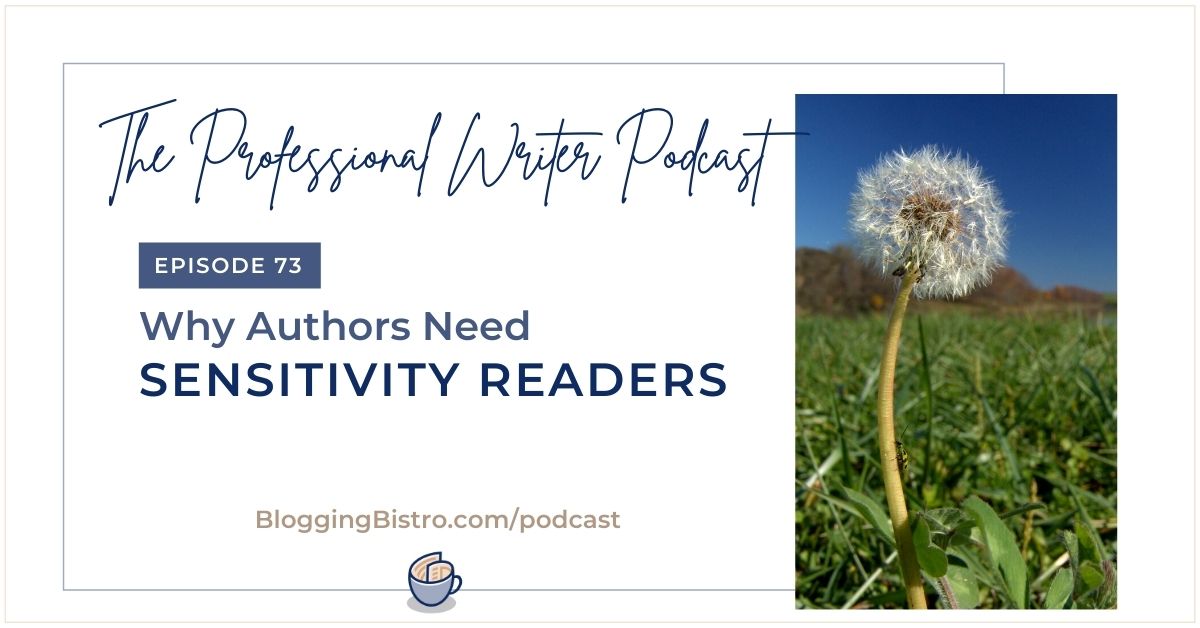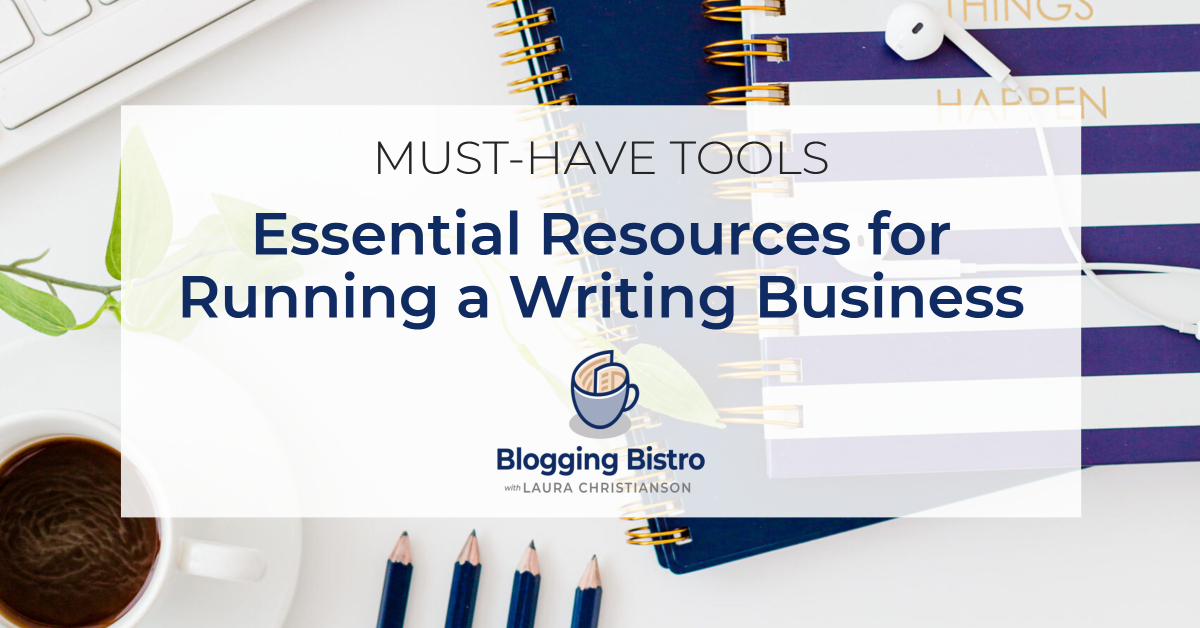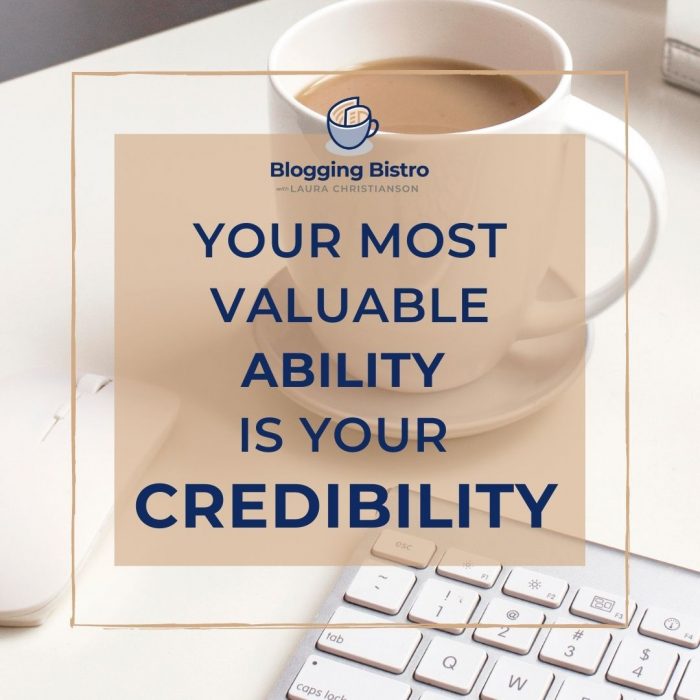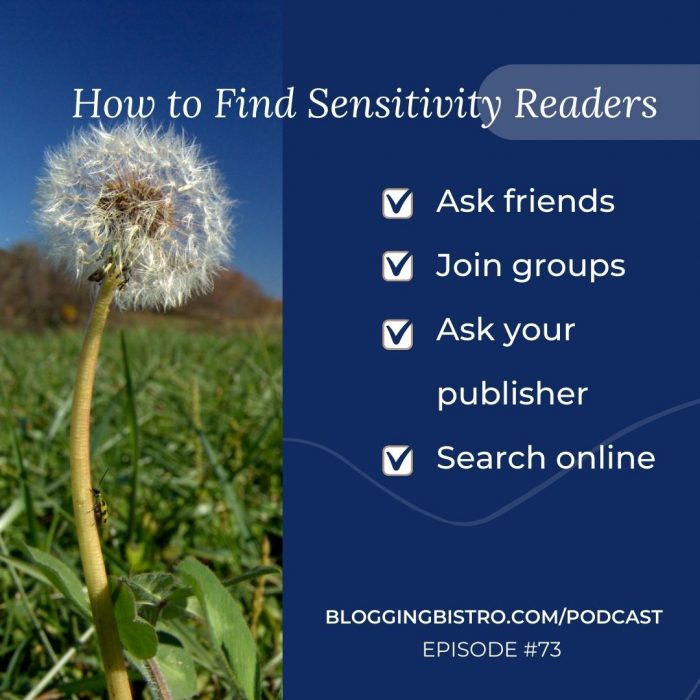73 – Sensitivity Readers and Subject Matter Experts: Why Authors Need Them
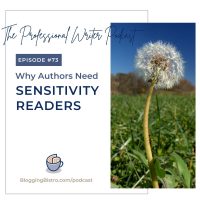
“I researched my topic thoroughly, so it must be correct.”
“I write fiction, so I can make everything up and readers won’t care whether it’s accurate.”
REALITY CHECK!
Readers do care. They do notice inaccurate, insensitive, stereotypical portrayals of culture, race, religion, and more.
Your most valuable ability is your credibility.
That’s why sensitivity readers, subject matter experts, and fact-checkers are crucial. In episode 73, five authors recount their thoughts about this important topic. I’ll share anecdotes from:
- Karen Barnett, historical romance novelist of eight books
- Janet McHenry, award-winning speaker and author of 24 books
- Deb Gorman, author of three non-fiction books and working on several fiction manuscripts
- Wendy Propps Casto, nuclear medicine technologist who is working on her memoir
- Michelle Ule, bestselling author of historical novellas, an essayist, blogger, and biographer
You’ll learn:
- What a sensitivity reader is
- How much it costs to hire a sensitivity reader or subject matter expert
- Four ways to find sensitivity readers, subject matter experts, and fact-checker
The transcript at the bottom of this page includes today’s Word Nerd Moment and Massive Action Step, plus two shareable graphics.
More episodes in the series: Investments for Your Writing Business
Episode 70: 5 Quick, Easy, and Free Ways to Gain Visibility as a Writer
Five basic, FREE things authors can do right now to find great deals on writerly tools, interact with prospective readers and book buyers, and earn bonus income. Shareable infographic included.
Episode 71: Things I Spend Money on to Run My Writing Business
What I spend to run my business, how much to budget for essentials, and three things to do before investing in a service or tool. Transcript and loads of links included.
Episode 72: Costs of Self-Publishing a Book, with Lisa Baldwin
Debut memoir author, Lisa Baldwin, shares how several publishing professionals helped her shape her manuscript into an award-winning self-published book. We talk about Lisa’s pre-publication costs, publication costs, and hidden fees. Loads of links and resources.
Episode 69: Bookkeeping Tips for Your Biz, with Vanessa Butler
Bookkeeping expert, Vanessa Butler, helps us evaluate the financial health of our business and efficiently do budgeting, bank accounts, and more.
How to Keep Up With the Show
Click here to join my my email list and I’ll notify you about every episode. (When you subscribe, you’ll also get my free guide, Essential Resources for Running a Writing Business.)
Join The Professional Writer Podcast Community (private Facebook group), where we discuss what we’re learning, meet our guests, and encourage one another on our writing journeys.
If you know a writer who would be interested in The Professional Writer Podcast, please share this link with them:
https://bloggingbistro.com/podcast
Thank you!
Laura
Read the Transcript
73 - Sensitivity Readers and Subject Matter Experts: Why Authors Need ThemWhen I was writing a book for prospective adoptive parents, I included some sidebar stories about people from the Bible for were birth parents, adoptive parents, and adopted people.
Two of my good friends had recently completed theology degrees in seminary, and they reviewed the content to evaluate whether it was theologically sound.
I also included interviews with birth parents. I wanted to be extra sensitive to birth parents in the parts of my book that referred to them, because people are often judgmental of birth parents, assuming them to be uncaring drug addicts or criminals who abandon their unwanted child.
In reality, most of the birth parents I’ve encountered are anything but. They are normal, caring people who experience an unplanned pregnancy. Like any parent, they have hopes and dreams for their child. Those who choose an adoptive family to raise their child typically do so with a tremendous amount of soul-searching, thought, anguish, and love.
At the time I was writing that book, I was involved in a discussion group that included birth parents, adopted people, and adoptive parents. One birth mom in that group had had a highly negative experience with adoption. The adoptive parents she had placed her child with had made a bunch of empty promises that they did not fulfill, and the birth mom was angry, resentful, and very outspoken about the bad rap she felt birth moms were getting.
Despite her anger and hurt, this woman was also very willing to listen to others’ viewpoints and she wanted to heal. She and I forged an online relationship. When I asked her to be a sensitivity reader for the chapters on birth parents, she agreed.
She provided blunt, honest feedback, and affirmed that my chapters that featured birth parents did so honestly, and with sensitivity and empathy.
Which brings me to the topic of today’s episode: Sensitivity readers.
After publishing my previous episode, 72, in which Lisa Baldwin walked us through the costs of self-publishing a book, I began receiving feedback from listeners. One listener, who is in the process of launching her own non-fiction self-published book, told me about how she hired experts to review it for accuracy and consistency.
She got me thinking… I wonder who else hires or solicits volunteer experts to review their book manuscripts or article drafts? What are some scenarios for which experts can provide valuable input?
You know what happens when I start thinking and wondering. I create a podcast episode around it, because I love sharing what I’m learning with you.
I asked members of The Professional Writer Podcast Community – our private Facebook group for listeners:
Prior to publishing a book or article (either non-fiction or fiction), have you hired consultants or enlisted friends who are experts in your topic to review the accuracy of your research, theology, historical events, etc.?
My listeners generously responded, and I’m sharing their responses with you today.
This is an important topic, and it’s one that is often overlooked, particularly by first-time authors and by some self-published authors who assume, “I wrote it so it must be correct.” Or “It’s fiction, so I can make everything up and my readers won’t care.”
Guess what? They DO care!
Karen Barnett, who was my guest in Episode 13, Giving Readers Exactly What They Want, is a historical romance novelist whose upcoming novel is set in Great Smoky Mountains National Park. She had two people read through the final draft: a retired GRSM ranger and a blogger who specializes in regional dialect.
For one of her previous novels, a Yellowstone novel titled Ever Faithful, “the park historian kindly fact-checked the book.”
Karen writes:
I’m always worried about mistakes, so I do a lot of research for my novels. After it’s written, I enlist some experts to read the final draft (or pertinent sections) to make sure it’s as accurate as I can make it.”
“If you incorporate cultures other than your own, it’s wise to have sensitivity readers who can catch anything that might be deemed offensive.”
“For those of us who write fiction, readers trust that our stories are grounded in some sort of truth. We have a responsibility to honor that trust.”
Word Nerd Moment
Karen mentioned the term, “sensitivity readers.”
A sensitivity reader is a type of beta reader or copyeditor who reviews an unpublished manuscript specifically for:
- Insensitive, stereotypical, biased, inaccurate, or offensive portrayals of race, religion, sexuality, culture, ethnicity, physical disabilities, mental illness, ageism, trauma
- lack of understanding
- problematic language
- accuracy of science, theology, procedures
Often, a sensitivity reader will come from the community the author is writing about, so they have a deep personal knowledge and experience with that community. They may also have a significant amount of academic experience within that community.
In Karen Barnett’s case, the park ranger and park historian were both deeply entrenched in their respective communities, and they had a lot of historical academic knowledge, as well. The blogger who specializes in regional dialect also brought a high level of specific skills to the table.
When you work with a sensitivity reader or subject matter expert, they will note the problems they find in your work and will offer solutions for how to fix them.
Sensitivity readers have become a “thing” during the past 5-10 years, as publishers have become more aware that not everyone wants to write – or read – books that feature white, middle-class people.
As we writers seek to feature people and characters with diverse backgrounds, who represent a variety of cultures and ways of life that are beyond our own scope of experience, sensitivity readers can help us represent those people as thoughtfully and accurately as possible.
Many traditional publishers have freelance sensitivity readers in their stable, and they may include this in an author’s publishing contract. Or, they may encourage the author to hire one or more sensitivity readers on their own dime.
While hiring sensitivity readers is an option, you may also be able to find volunteers to serve as sensitivity readers, like I did when I was writing my book for prospective adoptive parents.
Janet McHenry, an award-winning speaker and the author of 24 books, volunteers to field questions about what it’s like to be a public school teacher.
Janet says:
“I read one novel where the writer made errors about the profession . . . and she lost credibility with me for that book.”
As a former public school teacher myself and the wife, mother, aunt, and sister-in-law of numerous public school teachers, I’m so grateful for people like Janet.
I recall the time I was teaching at a conference and the attendees and faculty went out to dinner together. I was sitting at a table with three other women whom I’d never met before, and one of them went on a long and vicious rant about the evils of public education and teachers in general.
You could practically see the steam shooting out my ears. Finally, when I couldn’t take it any longer, I politely-but-pointedly asked, “When was the last time you visited a public school or volunteered at one?”
“Oh, never!” she replied.
“So, where are you getting the information that all public school teachers are evil demons from hell?” I asked. “Did you know, that out of the nearly 3 ½ million public school teachers in the U.S., it’s estimated that at least 30% of them are people of faith?”
I was getting on a roll, so I continued. “My husband is one of them. And my son. And my mother-in-law. Three of my sisters-in-law. Two of my brothers-in-law. Several of my nieces.”
“These people don’t teach because of the astronomical salary, or the fact that they get so much respect from their students and the parents of those students and the public, in general. They teach because it’s a calling. A passion. For many, it’s a mission field on which they can’t openly express their faith, but they can certainly live out their faith.”
“I never thought about it that way,” the woman admitted.
I’m hopeful that, the next time this woman considers spouting off about public education, she will remember our conversation.
Thank you, Janet McHenry, for offering to field questions about what it’s like to be a public school teacher. I suspect that you field questions with more grace and tact than I do!
Massive Action Step
Your most valuable ability is your credibility.
Whether you’re writing fiction or non-fiction, you will lose credibility with your readers when you make errors or assumptions about not just the teaching profession, but any profession. Engaging the services of someone who lives that profession to review your manuscript will help you establish and grow your credibility.
If you’re preparing to write a book or article and you know you’ll be including information that is outside your scope of experience, create a list or spreadsheet of people you can ask to serve as sensitivity readers or subject matter experts.
It’s fine – even recommended – to have more than one sensitivity reader, as each person will contribute a unique perspective.
How to find sensitivity readers
You may not have to search too far to find subject matter experts and sensitivity readers.
Deb Gorman is working on a novel in which one of the characters lives in the wilds of NE Washington State and hunts. He also runs a B&B with his wife.
Deb says:
“When needing information on what type of weapon he might hunt with, and/or carry for protection, I consult my live-in expert…my husband!”
Deb’s comment reminded me that consulting with local experts about the correct spelling and pronunciation of state and city names, rivers, lakes, and mountains and indigenous peoples – is also crucial.
The other day I was watching a movie and the character announced, “I’m from Are-uh-gone.” He meant “Oregon.”
I replied to the television, “No, you’re not.”
Although I was born in Oregon, I have spent most of my life in Oregon’s neighbor to the north, Washington. In Washington, we have loads of challenging-to-spell and even more challenging-to-pronounce Native American words.
To add to the confusion, many of the words sound similar. There’s Snohomish, Skykomish, Skokomish, Stillaguamish, Sammamish, Samish – and those are the easy ones!
When you’re looking for sensitivity readers and subject matter experts, start close to home – maybe even as close as the person you share your bed with.
For pronunciation of challenging words – which is particularly important for speakers and podcasters – you can almost always find YouTube videos that feature a native speaker pronouncing the word.
Or, you can post on social media: How do you pronounce the name of the town in Washington State that’s spelled Puyallup?
Non-Fiction
We’ve talked about sensitivity readers and subject matter experts for fiction. Now, let’s focus on some non-fiction examples from my listeners.
Memoir
Wendy Propps Casto is a nuclear medicine technologist who became a healthcare whistleblower when her supervisor gave orders that endangered patient lives.
Here’s Wendy’s backstory, in her words:
“I spoke up to my supervisor and the Director of Radiology, but they did not want to correct the problem, so I took my concerns to a contact in HR. The hospital retaliated and tried to drive me out. I stood my ground, so they made up false charges and fired me. It took three years to make it to trial in a wrongful termination suit, but the jury unanimously found in my favor and against the hospital on all six counts, so I’m free to tell everything.
“I can quote from 280 trial exhibits (mostly hospital emails and policies), and transcripts from six days at trial.”
Wendy is working on a memoir that is supported by reams of court and trial documents. For fact-checking, she relies on her own documentation – emails, texts, instant messages, digital photos, social media posts, her own medical records, and other verifiable information that’s time-stamped. She has organized everything chronologically in binders.
Biography
Fact-checking is extremely important for both non-fiction and fiction writers. Michelle Ule should know; she writes both!
Michelle says:
“The last thing you want to do is make a factual error about someone famous – whether alive or dead.”
As the biographer of Mrs. Oswald Chambers: The Woman Behind the World’s Bestselling Devotional, Michelle says she “had access and cordial relations with experts or those in ministry who knew the subject. (Oswald Chambers’ biographer, for example).”
She says that this access was very helpful and encouraging and that she corrected several errors as a result.
Michelle also relies on fact-checkers when she’s blogging. “If I write about someone, I give them the opportunity to review the post before I publish.”
Costs of working with fact-checkers and sensitivity readers
As you are budgeting for your writing-related business or planning your next piece, you may want to include a line item for fact-checkers and sensitivity readers.
Working with these people may cost you nothing monetarily, as they are often volunteers.
However, if you’re writing about a sensitive topic or you’re working on a piece that requires lots of research or theology or interviews or court documents or digging up of primary sources, you will want to budget anywhere from around $300 (for starters) to several thousand dollars, depending on the amount and complexity of fact-checking you anticipate needing.
4 ways you can find sensitivity readers
Start close to home, asking friends who they’d recommend to be a sensitivity reader or fact-checker.
Join organizations and online groups that revolve around the topic you’re researching and ask questions of the other group members.
If you are contracted with a traditional publisher, ask them for recommendations.
Search for “sensitivity readers” online. There are several directories and databases from which you can request or hire a freelance copyeditor who specializes in the topic you’re researching.
For example, here are just a few of the specialties I found in one directory:
- Interracial marriage
- Degenerative joint disease
- Social anxiety
- Biracial (black and white)
- Muslim
- Post-Traumatic Stress Disorder
- Weight-loss surgery
- Transgender
- Blindness
- South Asian immigrant
- Medical literature
- Family trauma
- Workplace discrimination
- Autism Spectrum Disorder
We already talked about one of the costs of NOT working with fact-checkers and sensitivity readers – damage to your credibility.
I encourage you to reach out to experts. Don’t stop yourself from contacting them with the excuse that they’re “too famous” or “too busy.” Or, “I’m a nobody. They’d never want to talk with me.”
You’d be surprised at just how available and eager to help many experts are. Michelle Ule offers a wise reminder for us: She says that none of us want our subject misinterpreted or misrepresented.
As such, experts in the field are usually happy to accommodate us.

